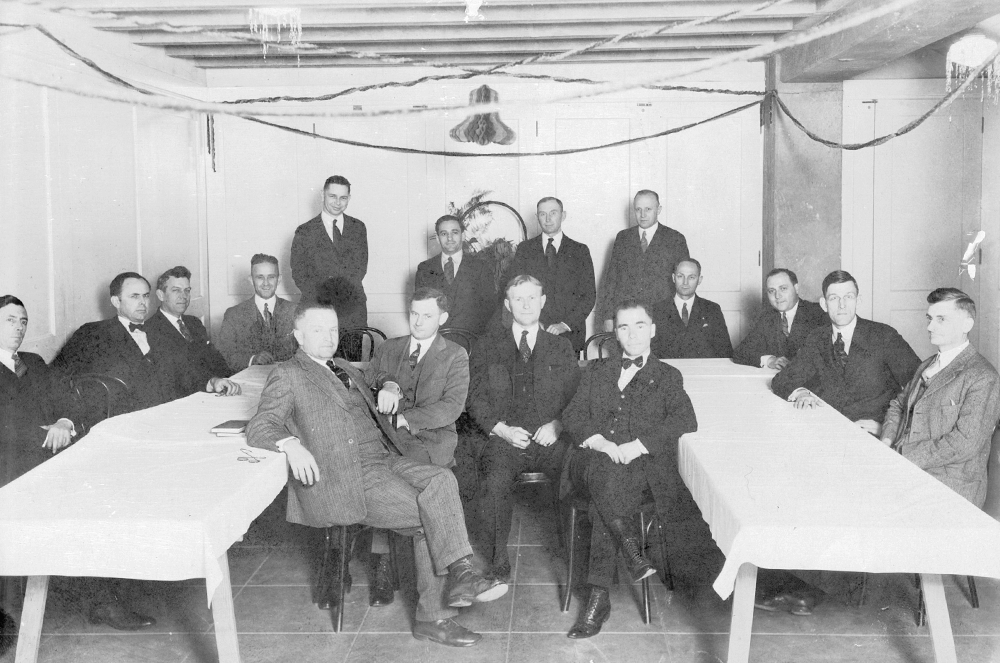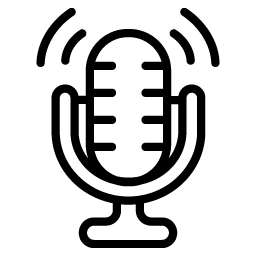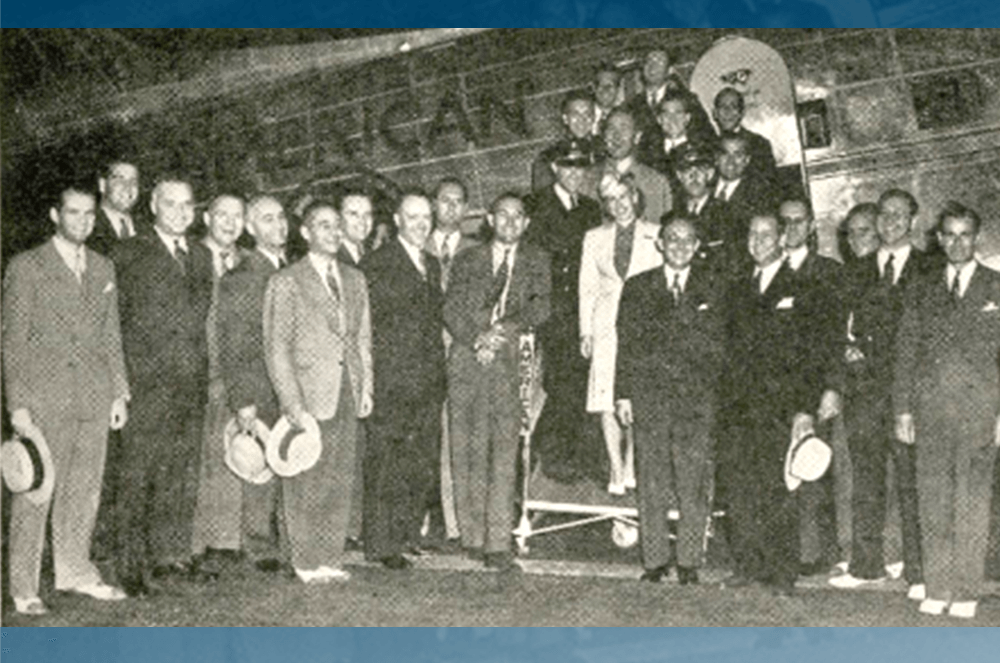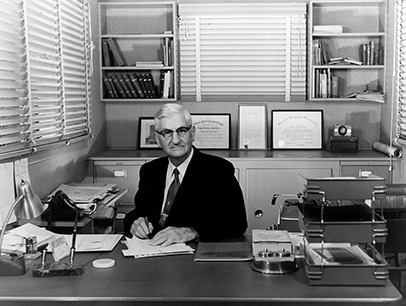
The men who gathered for the first time in the basement of the YMCA in Santa Ana, California, on October 22, 1924, were unknowing visionaries. Even their sage leader, Dr. Ralph C. Smedley, could have hardly imagined this fledgling club would be the foundation of one of the world’s foremost nonprofit organizations for speaking and leadership education.
That club was Toastmasters’ first—later dubbed the Smedley Chapter One Club. Since 1924, the club has held more than 2,400 meetings, and it welcomes seasoned Toastmasters and eager newcomers to this day. The hybrid community club meets twice a month, online and in person at the First Presbyterian Church of Santa Ana. Amazingly, this was the church Smedley himself attended and is just 100 yards from the club’s original YMCA meeting site. The Chapter One club includes local residents as well as remote members from the United States, Kuwait, India, Japan, Peru, and other countries.
The club's historical fame has long been a draw for members, including six-year member and Club President Junaidi Tjen. “I’m very proud to be part of this historic club,” he says. “We want to help ensure Dr. Smedley’s mission never ceases. In fact, I think it’s the wish of every Toastmaster to see this club continue.”
At age 146, Smedley himself attends every club meeting as a photograph sitting on a chair at the front of the room. Each meeting starts with a brief history of the club, which is especially intriguing for new members and guests, Tjen says.
“I was always attracted to the rich history of this club,” adds Julie Murphy, DTM, the club’s Vice President Membership and former Founder’s District Director. “All that we do today as Toastmasters started with this club—everyone has adapted from Smedley Number One. So to me, it’s like a pilgrimage to participate in this club.”

A framed photograph of Dr. Ralph C. Smedley sits on a chair at every meeting of the Smedley Chapter One Club–a reminder of the club's rich history.
A Leader Emerges
Ralph Smedley was a natural leader, starting with his days as a stellar student at Illinois Wesleyan University in Bloomington, Illinois. He had a special passion for education and organizing groups designed to teach by doing, especially communication skills.
After college, he organized Toastmasters clubs in cities where he worked in various leadership positions at the local YMCA. Even though these clubs didn’t last, the “Toastmasters idea” had been successfully tested in Smedley’s mind.
The Santa Ana YMCA building where the Chapter One club originally met is currently undergoing renovation. (Smedley himself assisted with the original building plans and supervised construction of the building.) It is listed on both the Santa Ana Historic Register and the United States Register of Historic Places, with both Smedley’s and Toastmasters’ names appearing on the 1993 federal nomination form.
The club met in the YMCA basement from 1924 to 1928 before moving to Ketner’s Café (until 1935) and other meeting places. Had they continued meeting at the Y, their space would have survived earthquakes in 1933 and 1971, due to the 18-inch-thick walls specified by Smedley and the architect of the building.
In 1958, Smedley Chapter One honored its leader by dedicating a Founder’s Room in the Y’s basement, along with a plaque noting the Toastmasters club’s birthplace.

History Begins
The club’s start was a colorful one. In October 1924, the Santa Ana Register newspaper announced that YMCA general secretary Ralph Smedley was forming a club to “strengthen the streams of oratory” for its members. An October 21 newspaper announcement noted that approximately 25 reservations had been made for the meeting, and that 30 spots was the limit to ensure everyone had a chance to speak.
That first meeting featured a 50-cent dinner and drew local businessmen, educators, the media, and civic leaders. The club was originally dubbed the Toastmasters Club or the YMCA Toastmasters by the Santa Ana Register, which published weekly club reports. In 1927, then-Club President Chester Hawk suggested the name Smedley Toastmasters Club Number One, which was resoundingly adopted. Within several years, the club name was adjusted to Smedley Chapter Number One, and later on, “number” was deleted from the name.
During these early years, the club was going “full blast,” with a waiting list for membership, according to a report in a 1933 issue of The Toastmaster magazine. Sixty new clubs cited the Smedley club as their organizational inspiration.
Bob Palmer, DTM, a 51-year member of Prime Time Toastmasters in Riverside, California, is an expert on Toastmasters history and has a wealth of knowledge about Smedley Chapter One. According to Palmer, the club introduced an extemporaneous-speaking activity in 1931 called “table chatter”—a precursor to the Toastmasters activity later known as Table Topics®. The Santa Ana Register noted that early meeting roles included the “chief critic” (now the General Evaluator) and “critics” (now speech evaluators) for audience feedback.
Smedley Chapter One enjoyed remarkable success as soon as it chartered. In 1930, the first issue of The Gavel commended the club for winning multiple speaking awards from the California Bankers Association and thanked Smedley for bringing his “novel idea” to its “present state of perfection.”
The Smedley club also produced many Toastmasters leaders, including 1942–1943 International President Ted Blanding, who served as the organization’s first Executive Director from 1945 to 1958. The club’s first DTMs included Bob Gorby, a 51-year Toastmaster and 10-year member of the Chapter One club, where he is 2024–2025 Club Treasurer.

Listen to The Toastmasters Podcast to hear more from Bob Palmer.
Then Came COVID
Through the years the club survived the Great Depression, the World War II era, and all the common periodic membership drops and summer slumps. However, it was the COVID pandemic that finally threatened the club’s long history and close-knit culture. Like many clubs, Smedley Chapter One didn’t escape the fallout. Needing to meet online led to a perilous drop in a membership that had long thrived on quality and face-to-face fellowship.
However, existing members rallied, bringing Simone Nash, DTM, onboard as a club coach in 2023. Nash, a 13-year Toastmaster and member of multiple clubs, relished the assignment. Because she lives in Taiwan, she served as an online coach (attending every meeting and helping through WhatsApp messages and frequent Zoom calls).
Steadily, the club upped its social media postings, streamlined its agenda to allow more time for speeches and Table Topics, hosted open houses, and improved guest follow-ups. Members are proud of earning 2023–2024 President’s Distinguished honors.
Nash says this has been her most rewarding coach assignment. She fell in love with the club and is now its 2024–2025 Vice President Education.
Smedley Chapter One has its heart and mission firmly set on the next 100 years: to lead a vibrant future while honoring the club’s long legacy.
Nash says, “We want to make Dr. Smedley proud!”
Stephanie Darling is a former senior editor of and frequent contributor to the Toastmaster magazine. District 12 historian Bob Palmer, DTM, also contributed to this article.



 Previous
Previous

 Previous Article
Previous Article

